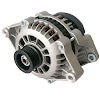Necessity of Cooling Towers in
thermal power station
The demand for electric power has increased to such an extent
that it is now no longer justifiable to site the large power station near river
sides. The present trend is to locate the power station near the load Centre
with an use of large and highly efficient cooling towers at the places where
the power stations are located away from the river areas.
A cooling tower is a semi enclosed device for evaporative
cooling of water by contact with air. It is a wooden, steel or concrete
structure and corrugated surfaces or troughs or baffles or perforated trays are
provided inside the tower for uniform distribution and better atomization of the
cooling tower on the top and allowed to tickle in from of thin sheets or drops.
The air flows from bottom of the tower or perpendicular to the direction of
water flow and then exhausts to the atmosphere after effective cooling. To prevent
the escape of water particles with air, draft eliminators are provided at the
top of the tower.
Factors affecting the cooling water in a cooling tower:
1. Temperature of air.
2. Humidity of air.
3. Temperature of hot water.
4. Size and height of tower
5. Velocity of air entering the tower
6. Accessibility of air to all parts of the cooling water.
7. Degree of uniformity in descending.
Types of cooling Towers
The cooling towers are mainly classified into following types :
1. Atmospheric cooling tower.
2. Natural draught cooling tower.
3. Forced or induced draught cooling tower
Atmospheric cooling tower
In this cooling tower hot water is allowed to fall over
louvers. The air flowing across in transverse direction cools the cools the
falling water. These towers are used for small capacity power plants such as
diesel power plants.
Natural draught cooling tower
The natural draft towers are closely built structures which
are quite tall and have the top portion working as stack. The cooling depends
upon the tower height and temperature of air, and so these towers have their
limitation when large cooling capacity is required.
Forced or induced draught cooling
towers
In the tower draught fan is installed at the bottom of tower.
The hot water from the condenser enters the nozzles. The water is sprayed over
the tower filling slots and the rising air cools the waters. A forced draught
cooling tower













0 Comments